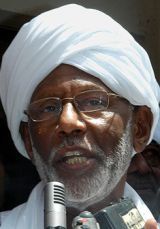Pressure Sudan and it will bow on Darfur – Turabi
March 5, 2007 (KHARTOUM) — Foreign pressure, including the threat of international justice, will force Sudan to finally allow United Nations intervention in Darfur, leading opposition figure Hassan al-Turabi said on Monday.
 A military stalemate in Darfur, pressure from Sudan’s southern politicians who share power in Khartoum and domestic political tensions will also drive the government of Omar al-Bashir to compromise, said Turabi.
A military stalemate in Darfur, pressure from Sudan’s southern politicians who share power in Khartoum and domestic political tensions will also drive the government of Omar al-Bashir to compromise, said Turabi.
“They want to say ‘yes’ a little bit (on Darfur) and ‘no’ to handing over any minister” to an international court said the lawyer and politician who was the Islamic ideologue behind Bashir’s rise in 1989 but gradually pushed out by the general.
Sudan has resisted international pressure to allow a 22,500 -strong U.N. force into the western Darfur province, where experts say some 200,000 people have been killed and 2.5 million others driven from their homes in a campaign against rebels who took up arms against the government in 2003.
Pro-government militias have been blamed for much of the violence. Bashir’s government has resisted outside involvement for fear it could undermine its grip on power despite pledges the U.N. force’s role would only be to protect civilians.
With little outward progress on Darfur, international calls for sanctions on Sudan’s leaders are growing.
Turabi, officially ostracised but still influential among Sudan’s elites, forecast Bashir would agree to a negotiated settlement over Darfur’s future in a national restructuring he gambles he could undertake and survive in office.
“It’s not only exclusively about Darfur. You can’t settle the issue of Darfur if there is (something) wrong with the structure of government,” said Turabi, calling for a constitutional revamp and free and fair elections.
Behind the scenes contacts have begun with Western mediators and a quiet climbdown by Sudan over Darfur was possible, provided it did not belittle the government in the eyes of the public, he said.
COOPERATE OVER CRIMES
Turabi said the government should cooperate with the ICC, which Sudan has said has no jurisdiction over its nationals.
Bashir has refused to hand over to the ICC a Sudan junior minister and a militia commander summoned by the court last week for alleged war crimes in Darfur.
“There is no justice here. Justice has to come from international courts, from outside,” said the 75-year-old cleric, who was been jailed and placed under house arrest but has more latitude to criticise than less prominent opponents.
Only giving Darfuris a genuine share in government in Khartoum, as was offered to the southern Sudanese to end a 1983-2005 civil war, can end the violence, he said.
“You can’t govern Sudan centrally,” he said. “That has been proven by blood, by suffering and by tragedies, so the next constitution would be decentralised, would ensure proper freedoms.”
Sudan was a “continent,” not a nation, he said, referring to the complex tribal, ethnic and religious divisions in Africa’s largest country that have fuelled near constant separatist conflict since independence from Britain in 1956.
In recent years Turabi has spoken of the need for democracy and human rights for Muslims, distancing himself from the radical Islamic stance of the early 1990s when Sudan gave sanctuary to Osama bin Laden and became a pariah state.
Bin Laden was expelled in 1996 and the Sudanese government has tried to repair relations with the West since, particularly after the 2001 al Qaeda attacks on the United States.
Critics say Khartoum’s help in Washington’s pursuit of Islamic radicals in east Africa is to blame for the U.S. reluctance to sanction Bashir’s government robustly over Darfur.
(Reuters)
